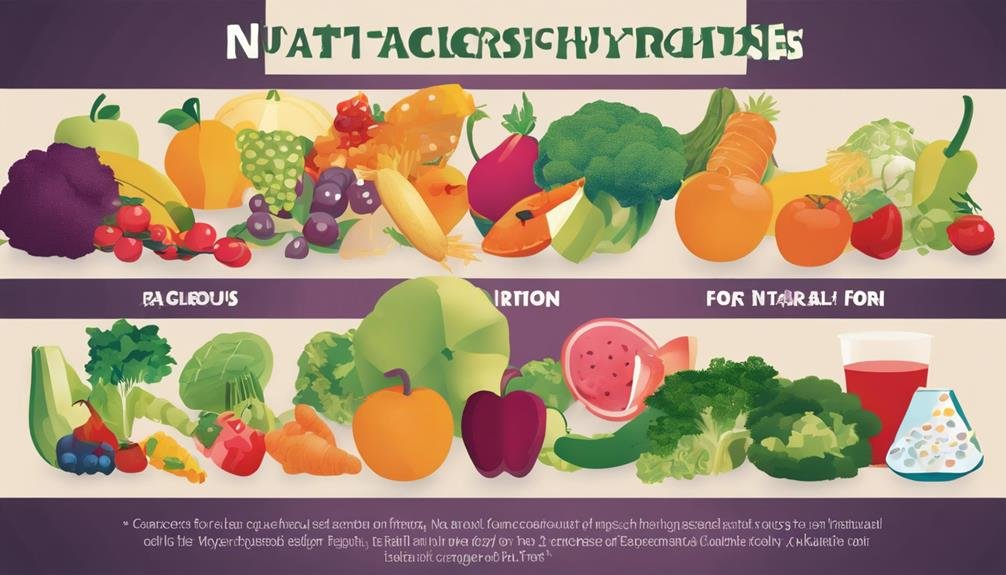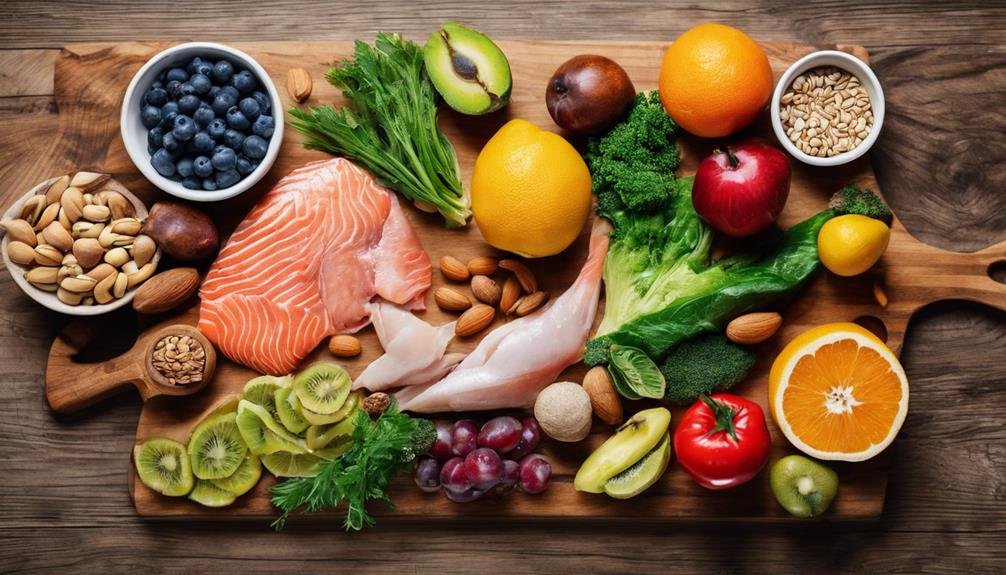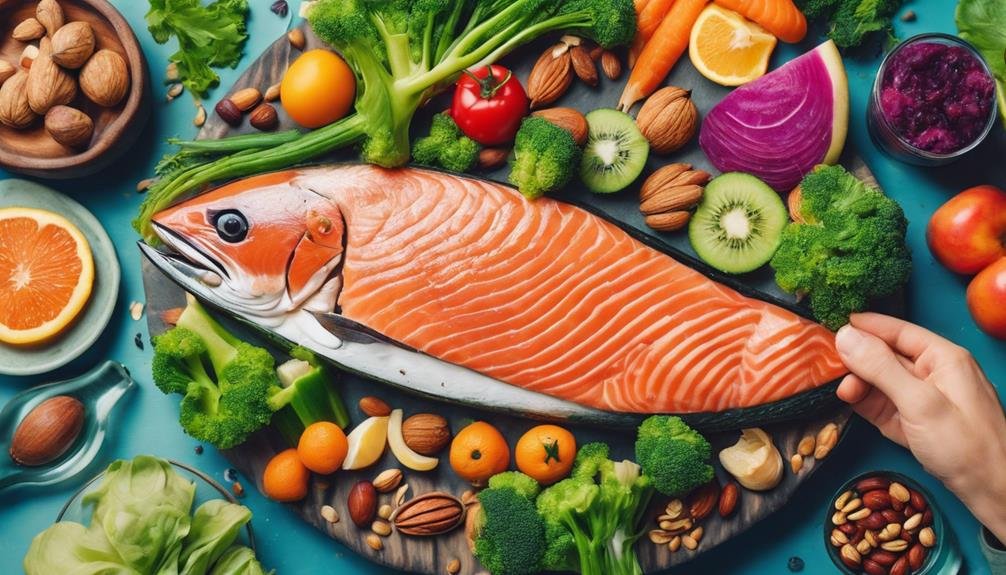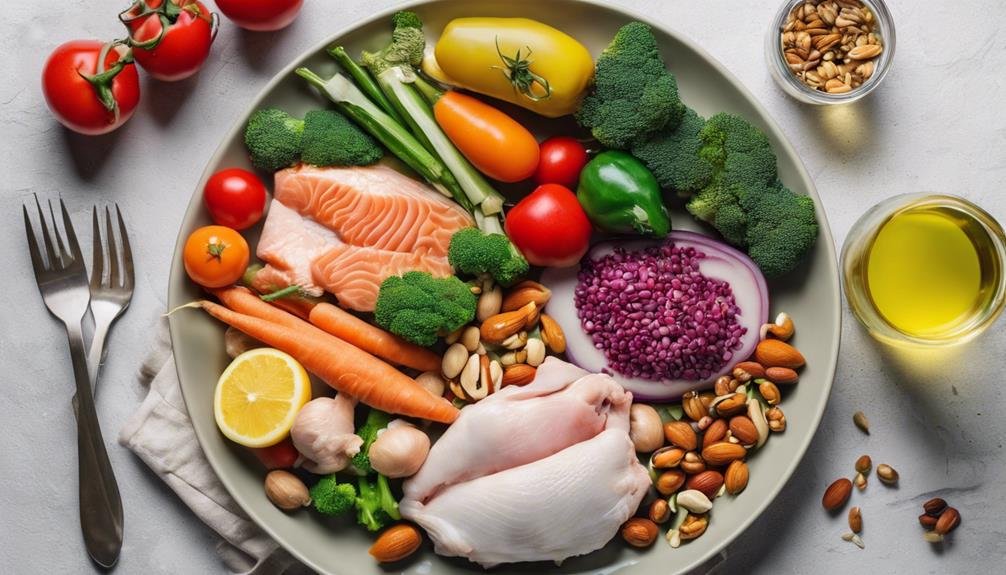Have you heard about the recent study where individuals following a Paleo diet showed a significant decrease in certain cancer markers compared to those on a standard diet? The findings hint at a potential link between the foods we consume and cancer outcomes. As you explore this topic further, you'll uncover intriguing insights into how the Paleo diet may impact cancer risk and progression.
Evolutionary Basis of Paleo Diet
Recent studies exploring the evolutionary basis of the Paleo diet have shed light on the potential benefits of this dietary approach.
The Paleo diet, inspired by the presumed diet of our Paleolithic ancestors, emphasizes whole foods like lean meats, fish, fruits, vegetables, nuts, and seeds while excluding processed foods, grains, dairy, and sugars. This way of eating aims to mimic the nutritional composition of ancient diets, which researchers suggest may have positive effects on health due to its high fiber, protein, and healthy fat content.
Impact on Inflammation Levels
Exploring the impact of the Paleo diet on inflammation levels reveals intriguing insights into how dietary choices can influence this crucial aspect of health. Research studies have shown:
- Reduced Inflammatory Markers: The Paleo diet, rich in anti-inflammatory foods like fruits, vegetables, nuts, and seeds, has been linked to lower levels of inflammatory markers in the body.
- Balanced Omega-3 to Omega-6 Ratio: By emphasizing grass-fed meats and fish, the Paleo diet helps maintain a healthier balance between omega-3 and omega-6 fatty acids, which can help decrease inflammation.
- Avoidance of Processed Foods: By eliminating processed foods, sugars, and refined grains, the Paleo diet minimizes triggers for inflammation in the body.
- Promotion of Gut Health: The emphasis on whole, nutrient-dense foods in the Paleo diet can support a healthy gut microbiome, which plays a significant role in regulating inflammation levels throughout the body.
These findings suggest that adopting a Paleo diet may contribute to reducing inflammation and promoting overall health.
Influence on Insulin Sensitivity
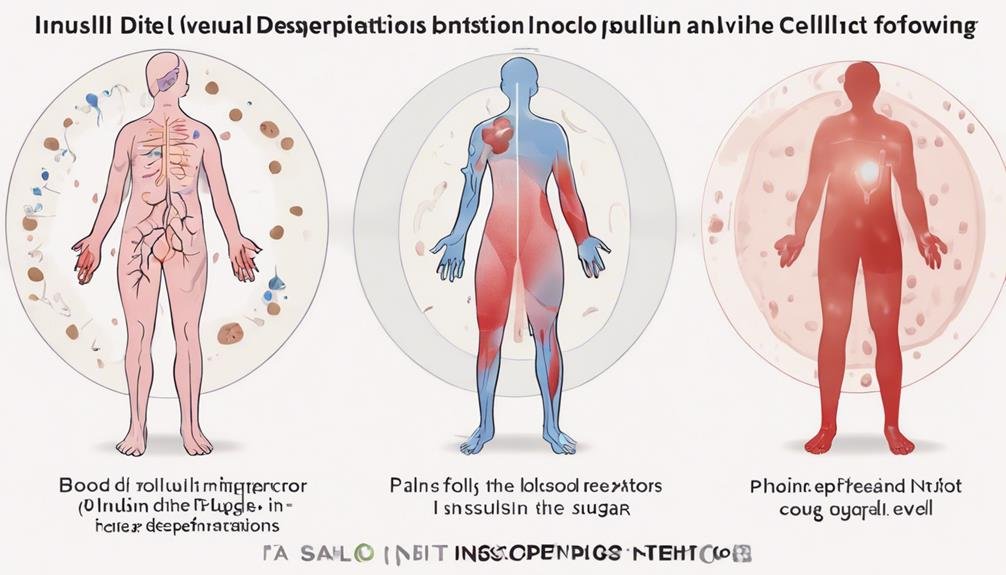
The impact of the Paleo diet on insulin sensitivity is a subject of growing interest in the realm of nutritional research. Studies have shown that following a Paleo diet, which emphasizes whole foods like lean meats, fish, fruits, vegetables, nuts, and seeds while avoiding processed foods, can have positive effects on insulin sensitivity. By excluding refined sugars, grains, and processed foods that can lead to spikes in blood sugar levels, the Paleo diet may help regulate insulin levels more effectively.
Research has indicated that the Paleo diet may contribute to improved insulin sensitivity by promoting weight loss, reducing inflammation, and enhancing overall metabolic health.
A study published in the European Journal of Clinical Nutrition found that participants following a Paleo diet experienced better insulin sensitivity compared to those following a traditional low-fat diet. These findings suggest that adopting a Paleo diet could be beneficial for individuals looking to enhance their insulin sensitivity and overall metabolic function.
Role in Reducing Oxidative Stress
How does the Paleo diet fare in the realm of reducing oxidative stress? Research suggests that following a Paleo diet may have beneficial effects on oxidative stress levels in the body. Here are some key points to consider:
- Antioxidant-rich Foods: The Paleo diet emphasizes whole foods such as fruits, vegetables, nuts, and seeds, which are high in antioxidants. These compounds help combat oxidative stress by neutralizing free radicals in the body.
- Reduction in Inflammatory Foods: By eliminating processed foods, refined sugars, and unhealthy fats, the Paleo diet may help reduce inflammation, which is closely linked to oxidative stress.
- Balanced Omega-3 to Omega-6 Ratio: The diet encourages the consumption of foods rich in omega-3 fatty acids, such as fish and grass-fed meats, which can help maintain a healthy balance between omega-3 and omega-6 fatty acids, potentially reducing oxidative stress.
- Improved Overall Nutrient Intake: By focusing on nutrient-dense foods, the Paleo diet can provide essential vitamins and minerals that support the body's antioxidant defense system, contributing to a reduction in oxidative stress levels.
Effects on Gut Microbiome
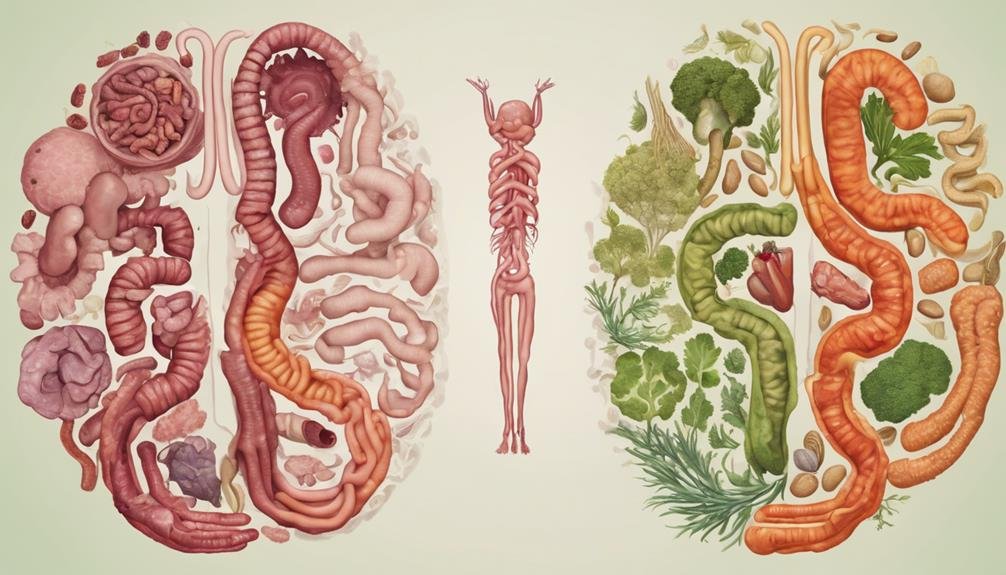
Moving from the discussion on reducing oxidative stress through the Paleo diet, it's pertinent to investigate its impact on the gut microbiome. Research suggests that the Paleo diet, rich in whole foods like fruits, vegetables, nuts, and seeds, can positively influence the composition of gut bacteria. This diet typically excludes processed foods, grains, and added sugars, which are known to disrupt the gut microbiome. By promoting the growth of beneficial bacteria and reducing inflammation in the gut, the Paleo diet may contribute to overall gut health.
Several studies have shown that the diversity of gut bacteria is greater in individuals following a Paleo diet compared to those on a standard Western diet. This increase in microbial diversity is linked to various health benefits, including improved digestion, strengthened immune function, and reduced risk of certain diseases.
While more research is needed to fully understand the mechanisms behind these effects, the Paleo diet appears to have a positive impact on the gut microbiome, which plays a crucial role in overall health and well-being.
Potential Link to Reduced Cancer Risk
Research indicates a potential association between following a Paleo diet and a reduced risk of certain types of cancer. The Paleo diet's emphasis on whole foods, lean proteins, fruits, and vegetables may contribute to this potential link. Here are some factors that could explain the reduced cancer risk:
- Anti-inflammatory Properties: The Paleo diet is rich in antioxidants and anti-inflammatory compounds, which may help reduce inflammation, a known factor in cancer development.
- Balanced Insulin Levels: By avoiding processed sugars and refined carbohydrates, the Paleo diet helps maintain stable blood sugar levels, potentially reducing the risk of insulin-related cancers.
- Improved Weight Management: Following a Paleo diet may support weight loss and healthy weight maintenance, which is linked to lower cancer risk.
- Elimination of Processed Foods: By excluding processed foods and artificial additives, the Paleo diet reduces exposure to potentially carcinogenic substances present in these products.
Consider incorporating aspects of the Paleo diet into your eating habits to potentially lower your risk of certain types of cancer.
Impact on Hormone Regulation
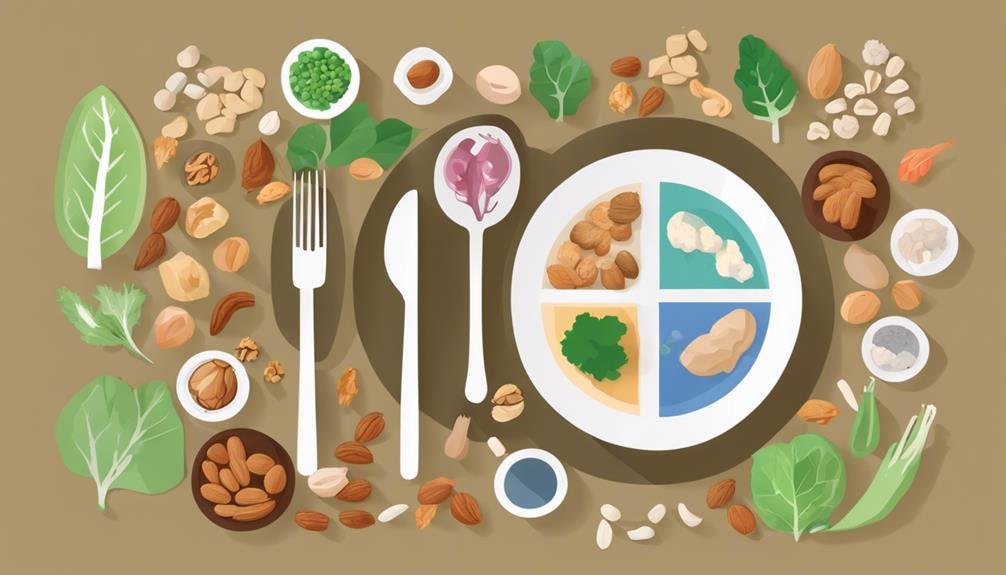
The Paleo diet's impact on hormone regulation is a topic of interest due to the potential influence of dietary choices on hormone levels within the body. Research suggests that the Paleo diet may positively impact hormone regulation by promoting a balanced intake of essential nutrients.
For instance, the emphasis on whole foods, lean proteins, fruits, and vegetables in the Paleo diet can support hormonal balance by providing key vitamins and minerals necessary for hormone production and regulation.
Moreover, the avoidance of processed foods, added sugars, and artificial additives in the Paleo diet may help prevent spikes in blood sugar levels, which can disrupt hormone balance.
Studies have shown that stabilizing blood sugar levels through dietary modifications like those in the Paleo diet may contribute to improved hormone regulation, particularly insulin sensitivity.
Relationship to Weight Management
With regards to weight management, the Paleo diet's emphasis on whole foods, lean proteins, and unprocessed ingredients has sparked interest in its potential impact on body weight. Here are some key points to consider:
- Satiety: The high protein and fiber content of the Paleo diet can promote feelings of fullness, potentially helping with weight management by reducing overall calorie intake.
- Nutrient Density: By focusing on whole, nutrient-dense foods, the Paleo diet can support weight management by providing essential nutrients while limiting empty calories.
- Reduction in Processed Foods: Eliminating processed foods and refined sugars may lead to a decreased calorie consumption, aiding in weight loss or maintenance.
- Promotion of Healthy Eating Habits: The emphasis on whole foods in the Paleo diet may encourage mindful eating practices, which can contribute to better weight management outcomes.
Considering these factors, the Paleo diet's alignment with whole foods and nutrient-dense options may potentially support individuals in achieving and maintaining a healthy weight.
Influence on Cellular Health
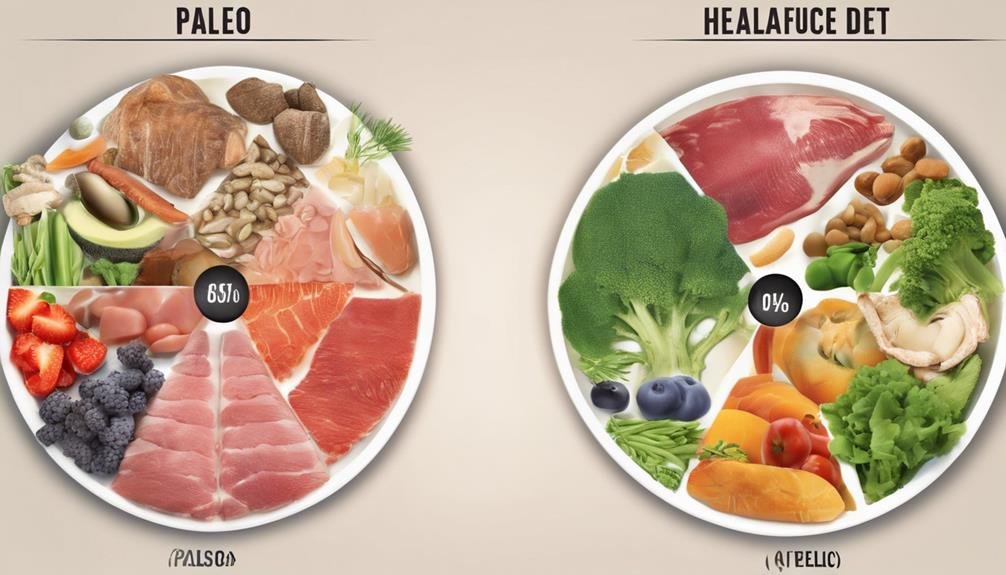
Numerous studies have indicated that the Paleo diet may have a significant influence on cellular health. The diet emphasizes whole foods like lean meats, fish, fruits, vegetables, nuts, and seeds while excluding processed foods, grains, dairy, and sugars. These nutrient-dense foods provide essential vitamins, minerals, and antioxidants that support the body at a cellular level.
The Paleo diet's focus on reducing inflammation and oxidative stress can help protect cells from damage and promote overall cellular health. By avoiding processed foods and sugars, which are known to contribute to cellular dysfunction, the Paleo diet may help maintain the integrity and function of your cells.
Additionally, the high intake of fruits and vegetables in the diet provides phytonutrients that support cellular processes and DNA repair mechanisms. While more research is needed to fully understand the impact of the Paleo diet on cellular health, current evidence suggests that following this diet may positively influence your cells and overall well-being.
Role in Promoting Immune Function
Several studies have highlighted the potential role of the Paleo diet in promoting immune function. Research suggests that following a Paleo diet may enhance your immune system in several ways:
- Increased Nutrient Intake: The diet emphasizes whole foods rich in essential vitamins and minerals that support immune health.
- Reduction of Inflammatory Foods: By avoiding processed foods and sugars, the Paleo diet may help reduce inflammation, which can bolster immune function.
- Gut Microbiome Support: The diet's focus on fiber-rich fruits and vegetables can nurture a healthy gut microbiome, crucial for a strong immune response.
- Antioxidant Protection: The consumption of antioxidant-rich foods like berries and nuts on the Paleo diet can help combat oxidative stress and support immune cell function.
Connection to Tumor Growth Inhibition
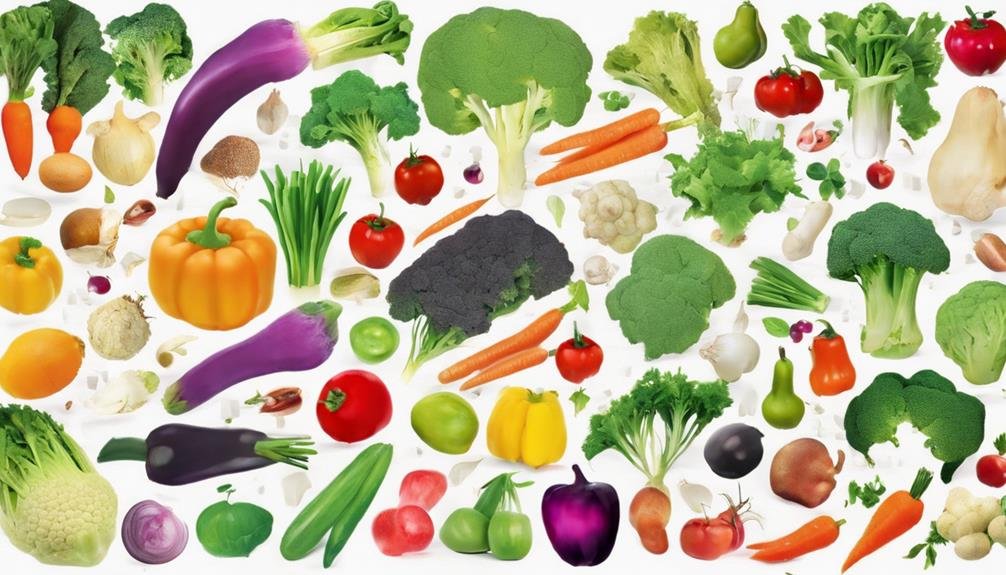
Studying the potential connection between the Paleo diet and tumor growth inhibition reveals intriguing findings. Research suggests that the Paleo diet's emphasis on whole foods, lean proteins, fruits, vegetables, and healthy fats may play a role in inhibiting tumor growth. The diet's exclusion of processed foods, sugars, and grains could potentially create an environment in the body that's less conducive to cancer development and progression.
Certain components of the Paleo diet, such as high antioxidant levels from fruits and vegetables, omega-3 fatty acids from fish, and anti-inflammatory properties from nuts and seeds, may contribute to reducing inflammation and oxidative stress in the body. These factors are crucial in inhibiting the growth of tumors and preventing them from spreading to other parts of the body.
While more research is needed to fully understand the specific mechanisms behind how the Paleo diet may inhibit tumor growth, preliminary studies show promising results. Incorporating the principles of the Paleo diet alongside traditional cancer treatments may offer additional benefits in the fight against cancer.
Considerations for Cancer Patients
Exploring the implications of the Paleo diet for individuals undergoing cancer treatment requires careful consideration of various factors. When considering the Paleo diet for cancer patients, keep in mind the following:
- Nutrient Adequacy: Ensure that the diet provides all essential nutrients needed for recovery and overall health.
- Digestive Health: Consider the impact of the diet on digestion, especially if the patient is experiencing gastrointestinal issues due to cancer treatments.
- Weight Maintenance: Monitor weight changes closely, as maintaining a healthy weight is crucial for cancer patients undergoing treatment.
- Individual Needs: Tailor the diet to the specific requirements and preferences of the patient, considering any dietary restrictions or intolerances they may have.
Frequently Asked Questions
Can the Paleo Diet Prevent All Types of Cancer?
The paleo diet isn't a guaranteed method to prevent all types of cancer. While it emphasizes whole foods, lean proteins, and vegetables, it may lack certain nutrients that are essential for cancer prevention.
It's important to remember that cancer prevention is a complex issue influenced by various factors beyond just diet. Consulting with a healthcare professional and maintaining a balanced lifestyle, including regular exercise and screenings, are key components in reducing cancer risk.
Does the Paleo Diet Work for Cancer Survivors?
If you're a cancer survivor, adopting a paleo diet might offer benefits. This dietary approach emphasizes whole foods and limits processed items, potentially aiding in overall health. While individual responses vary, some survivors report feeling better with this diet. Consulting a healthcare provider is crucial to ensure balanced nutrition and personalized care. Remember, your well-being is the priority, so consider discussing dietary changes with your medical team.
Are There Specific Foods to Avoid on the Paleo Diet for Cancer Prevention?
To prevent cancer on the paleo diet, avoid processed foods, refined sugars, and grains. These items may contribute to inflammation and increase cancer risk.
Instead, focus on whole, nutrient-dense foods like fruits, vegetables, lean proteins, and healthy fats. By choosing these options, you can support your overall health and potentially reduce your chances of developing cancer.
How Does the Paleo Diet Affect Cancer Treatment Outcomes?
The Paleo diet can potentially impact cancer treatment outcomes positively. By focusing on whole foods, lean proteins, and healthy fats, this diet may assist in maintaining a balanced weight and reducing inflammation, which are crucial factors in cancer treatment.
Additionally, the diet eliminates processed foods and refined sugars, which can contribute to overall health and well-being during cancer therapy.
Always consult with healthcare providers for personalized dietary recommendations during cancer treatment.
Is the Paleo Diet Safe for Individuals Undergoing Chemotherapy or Radiation Therapy?
Feeding your body during chemotherapy or radiation therapy is crucial. The paleo diet, rich in whole foods, might provide the nutrients needed for your journey. Always consult your healthcare team to ensure it aligns with your treatment plan.
Embrace this dietary path cautiously, as individual responses vary. Remember, balance is key. Listen to your body and stay informed to make the best decisions for your health during this challenging time.
Conclusion
In conclusion, studies show that the Paleo diet may have significant benefits in reducing cancer risk and inhibiting tumor growth. One interesting statistic to note is that a study published in the Journal of Nutrition found that following a Paleo diet led to a 26% reduction in inflammation markers, which are linked to cancer development. These findings suggest that incorporating Paleo principles into your diet could have a positive impact on your overall cancer prevention and management efforts.
